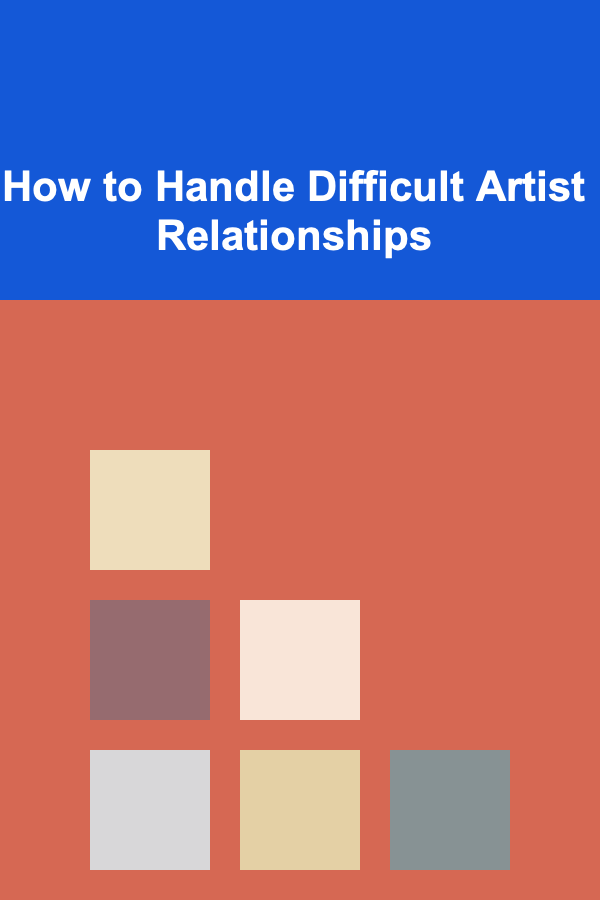
How to Handle Difficult Artist Relationships
ebook include PDF & Audio bundle (Micro Guide)
$12.99$6.99
Limited Time Offer! Order within the next:

Working with artists, whether they are musicians, visual artists, actors, or other types of performers, is a dynamic and often rewarding experience. However, like any professional relationship, it can also come with its share of challenges. Artists are known for their creativity and passion, which can sometimes manifest in ways that are difficult to manage in a business context. These relationships require a unique blend of empathy, professionalism, and effective communication.
This article will provide an in-depth exploration of how to handle difficult artist relationships, offering practical advice and strategies for professionals working in the entertainment, arts, or creative industries. From understanding the psychology of artists to setting clear boundaries and managing expectations, we will dive into the key aspects of building and maintaining healthy, productive relationships with artists.
Understanding the Nature of Artist Relationships
The Psychology of Artists
Artists are often driven by deep emotional and psychological factors. Their work is a direct reflection of their inner world, which can make them sensitive to criticism, protective of their creative vision, and prone to periods of emotional highs and lows. This can create unique challenges for anyone managing or working with them.
- Emotional Investment: Artists are deeply invested in their work, often seeing it as an extension of themselves. This means that when they face criticism or rejection, it can feel personal, and their response can be more emotional than rational.
- Creative Vision: Many artists have a strong sense of their creative vision and are unwilling to compromise on certain aspects of their work. This can lead to conflicts when business decisions or external influences seem to undermine that vision.
- Sensitivity to Feedback: Artists may be particularly sensitive to feedback, especially if it challenges their artistic integrity or vision. A constructive critique can sometimes be perceived as a personal attack, and this can create tension in professional relationships.
- Unpredictable Behavior: Due to the emotional nature of their work, artists can sometimes exhibit unpredictable or erratic behavior. They may experience periods of intense inspiration followed by creative blocks, or their mood may swing based on personal experiences.
Types of Difficult Artist Relationships
Difficult artist relationships can manifest in various ways. Some common challenges include:
- Communication Breakdown: Misunderstandings or lack of clear communication can quickly escalate into conflicts. Artists may feel that their needs or desires are not being heard, leading to frustration and resentment.
- Creative Differences: A common challenge in any creative project is the clash of visions. When artists and professionals have differing ideas about the direction of a project, tension can arise. This is particularly challenging when a project has a clear deadline or commercial goal.
- Unrealistic Expectations: Artists may have unrealistic expectations about their career trajectory, compensation, or the amount of support they should receive. This can lead to dissatisfaction and frustration if their expectations aren't met.
- Personality Clashes: As with any professional relationship, differences in personality can cause friction. For example, an artist may have a more introverted or eccentric personality, while their manager or promoter is highly organized and business-focused. These differences can create tension if not managed effectively.
- Financial Issues: Money is often a source of tension in any business relationship, and working with artists is no exception. Artists may feel underpaid or undervalued, especially when they are not receiving the financial compensation they expect for their work. On the other hand, those handling the business side may struggle to communicate the financial constraints or commercial realities that affect the artist's compensation.
Strategies for Managing Difficult Artist Relationships
While handling difficult artist relationships can be challenging, there are several strategies that can help ensure these relationships remain positive and productive. These strategies emphasize clear communication, empathy, and mutual respect.
1. Establish Clear Boundaries and Expectations
Setting clear boundaries and expectations at the outset of a professional relationship is crucial. This includes discussing the scope of the project, timelines, compensation, and any other important details.
- Contracts and Agreements: Always have a written agreement in place. This contract should outline the expectations of both parties, including deliverables, deadlines, compensation, and any other terms. Having a clear contract reduces the likelihood of misunderstandings and provides a reference point in case disputes arise.
- Define Roles and Responsibilities: Clearly outline who is responsible for what in the project. Artists should understand what is expected of them, and professionals should know their role in supporting the artist's needs. This helps avoid confusion and ensures everyone knows their boundaries.
- Set Realistic Goals: It is important to set achievable and realistic goals for both the artist and those working with them. Unrealistic expectations often lead to frustration and disappointment. By discussing the project's limitations and possible challenges upfront, both parties can work together to set more attainable targets.
2. Practice Active Listening and Empathy
Effective communication is the cornerstone of any successful professional relationship, especially when working with artists. Practicing active listening and empathy can help defuse potential conflicts and foster a positive, collaborative environment.
- Listen Without Judging: When an artist expresses frustration, concerns, or dissatisfaction, it is important to listen attentively and without judgment. This shows that you value their perspective and are committed to understanding their needs.
- Acknowledge Emotions: Artists often communicate their feelings and frustrations with passion. Instead of dismissing their emotions, acknowledge them and show understanding. For example, you might say, "I understand that you're feeling frustrated because you feel your creative vision is being compromised. Let's see how we can find a solution that works for both of us."
- Be Patient: Patience is key when dealing with difficult artists. They may need time to process their emotions or thoughts before they can effectively communicate. Allow them space to do so, without rushing or pressuring them for immediate responses.
3. Maintain Professionalism and Objectivity
While empathy is essential, maintaining a level of professionalism and objectivity is equally important. When conflicts arise, it's crucial to stay calm and focused on the task at hand.
- Avoid Personalizing the Situation: Artists may express frustration or dissatisfaction, but it is important not to take their comments personally. Understand that their emotions are often tied to their work, not to you as a person.
- Stay Solution-Oriented: When issues arise, focus on finding solutions rather than dwelling on problems. Offer suggestions and work collaboratively with the artist to resolve conflicts. This approach can help build mutual respect and strengthen the relationship.
- Don't Tolerate Unprofessional Behavior: While it's important to be empathetic, it's also essential to set limits on unprofessional behavior. If an artist is behaving inappropriately, it is your responsibility to address the issue calmly and professionally. Make it clear that certain behaviors are not acceptable in a professional setting.
4. Manage Expectations Realistically
One of the primary sources of conflict in artist relationships is unrealistic expectations. This can relate to compensation, career advancement, or the creative process. To avoid this, it is crucial to manage expectations from the outset.
- Be Transparent About Financials: Be upfront about budgets, compensation, and potential earnings. Avoid making promises that cannot be kept, as this will only lead to disappointment and mistrust later on. Ensure that both parties understand the financial constraints and realities of the project.
- Provide Honest Feedback: Be honest about the quality of the artist's work and the feasibility of their ideas. While it's important to be tactful and respectful, offering honest feedback helps the artist grow and avoids potential misunderstandings down the line.
- Set Realistic Deadlines: Be careful not to set deadlines that are too ambitious, especially when working with creative professionals. Artists may need time to refine their work, and setting an unreasonably tight deadline can lead to stress and poor results.
5. Know When to Seek Mediation or Professional Help
In some cases, despite your best efforts, the relationship may become too difficult to manage on your own. If conflicts continue or escalate, it may be time to seek outside assistance.
- Bring in a Mediator: If communication breaks down completely, a neutral third-party mediator can help facilitate a constructive conversation and help both sides reach a resolution. Mediators are trained to handle conflicts and can often find solutions that work for everyone involved.
- Consult Legal or Industry Professionals: In situations where contractual disputes or other serious issues arise, consulting with a legal professional or someone experienced in the industry may be necessary to ensure that both parties' rights are protected.
Conclusion
Handling difficult artist relationships requires a combination of emotional intelligence, professionalism, and clear communication. By establishing clear expectations, practicing empathy, and maintaining a level of objectivity, you can navigate the challenges that arise and build strong, productive relationships with artists. While every artist is unique, the key to success lies in understanding their needs and providing the support they require to succeed, while also maintaining a professional and mutually beneficial working relationship.
Reading More From Our Other Websites
- [Home Budget 101] How to Make Your Home More Energy-Efficient and Save Money
- [Hiking with Kids Tip 101] Backpack Basics: Packing Essentials for Hiking with a Toddler
- [Polymer Clay Modeling Tip 101] Transform Your Home Décor: DIY Polymer Clay Wall Art Ideas
- [Organization Tip 101] How to Choose the Best Wood Rot Repair Products for Your Home
- [Organization Tip 101] The Cost-Effectiveness of Using a Foundation Crack Repair Kit
- [Personal Care Tips 101] How to Tailor Your Personal Care to Seasonal Changes
- [Home Renovating 101] How to Tackle a DIY Home Renovation Project Safely
- [Home Holiday Decoration 101] How to Organize Holiday Activities for Families
- [Survival Kit 101] Backpacking Survival Kit: What You Need to Stay Prepared in the Wild
- [Home Security 101] How to Choose the Best Home Security Cameras for Your Property

How to Incorporate Blue Light Protection into Skincare
Read More
How To Use After Effects for Motion Graphics
Read More
How to Use Color Coding for Document Management
Read More
The Art of Fondant: A Comprehensive Guide to Cake Decorating
Read More
How to Style Your Graphic Art Portfolio for Maximum Impact
Read More
10 Tips for a Remote Job Application Checklist
Read MoreOther Products

How to Incorporate Blue Light Protection into Skincare
Read More
How To Use After Effects for Motion Graphics
Read More
How to Use Color Coding for Document Management
Read More
The Art of Fondant: A Comprehensive Guide to Cake Decorating
Read More
How to Style Your Graphic Art Portfolio for Maximum Impact
Read More